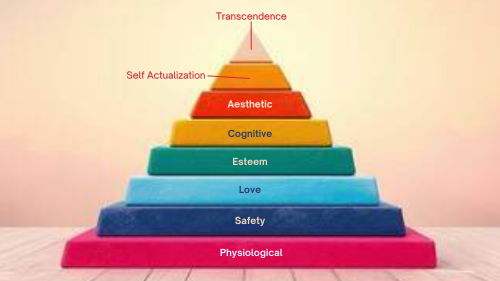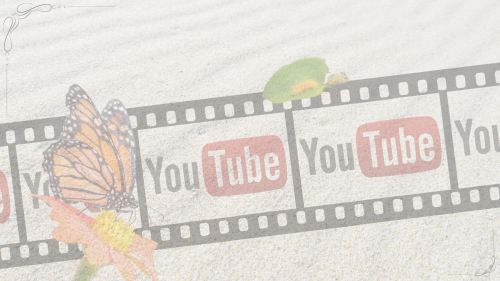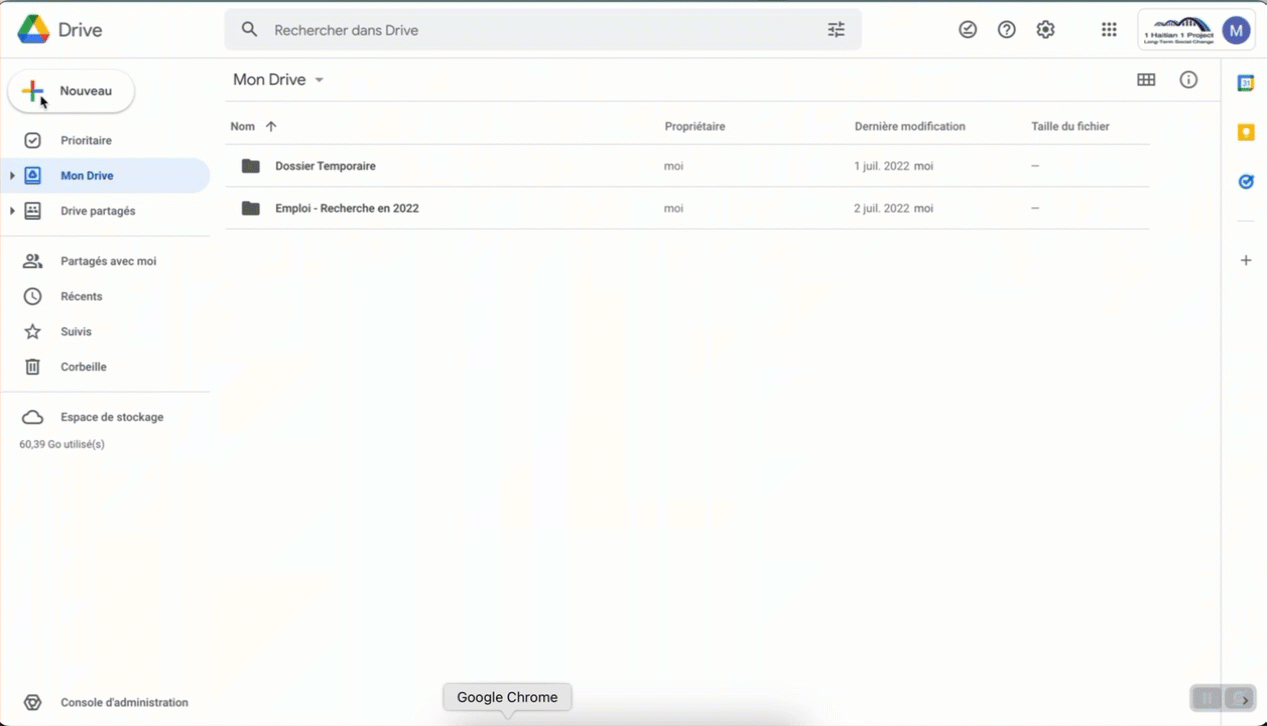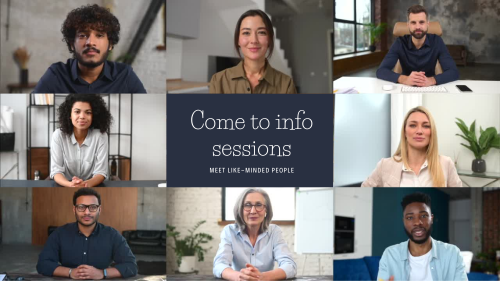
Free Resources
The Library
At this library, there is nothing to borrow or to return, no (late) fees. You have access to everything you see. In fact, you can go there to relax, to get information, to learn, to study, or to get training for free and acquire in-demand skills, which can be useful to you in the short as well as in the long terms.
- Reports
- Templates, Checklists & Guides
- Skill Training
- Language Learning
- Resources
- Movies, Theater, Shows
Get informed. Then, decide.
Access reports that are available regarding the U.N. SDGs worldwide when you click or tap the button.

Save time and get results right away. Be efficient.

Train on lucrative skills or just because you want to learn how to do something new.
Agriculture
(see videos 1, 92, 118, 120)
Planting with limited soil space
Art
Career & Business Skills
Computer Technology
Microsoft workshops and training
Microsoft Word, Excel, PowerPoint
Microsoft Access part 1, part 2, Outlook
16 HTML, CSS and Javascript projects
App design set 1, set 2, set 3
Big data and artificial intelligence
LinkedIn marketing set 1, set 2, set 3
Crochet, Knitting, Macrame
Fishing
Make-Up
Tutorial set 1, set 2, set 3, set 4, set 5, set 6
Sewing
Water
Learn how to speak one or more languages. Or, improve.
English set 1, set 2, set 3, set 4, set 5
Spanish set 1, set 2, set 3, set 4, set 5, set 6
French set 1, set 2, set 3, set 4, set 5, set 6, set 7, set 8, set 9, set 10, set 11, set 12
French set 13, set 14, set 15, set 16, set 17
German the alphabet - German set 1, set 2 - German conversations set 1, set 2
German listening practice - German Goethe exam preparation
Italian set 1, set 2, set 3, set 4
Learn Italian through songs set 1, set 2, set 3, set 4, set 5
Learn Igbo set 1, set 2, set 3 - alphabet, household stuff, cartoon
Learn Haitian Creole set 1, set 2, set 3, set 4, set 5, set 6, set 7 for kids
Learn Haitian Creole alphabet set 1, set 2
Aprann pale anglè ou menm ki se kreyòl ou pale
Learn Mina set 1, set 2, set 3, set 4, alphabet
Learn Ewe set 1, set 2, (Ewe language, people and culture), alphabet
Apprendre à parler Adja set 1, set 2, promoting Adja, etc

Some resources are academic. Other ones are of different types.
Determine your next move
Academic Learning
Chemistry lab inorganic, organic
Physics lab set 1
Agriculture
Invasive tree rescues Arizona town
Arizona turning into a farmland oasis
Art
Dancing set 1, set 2, set 3, set 4, set 5
Dancing set 6, set 7, set 8, set 9, set 10
Dancing set 11, set 12, set 13, set 14
Business Solutions
Construction
Best and worst places to build
Construction technologies you should see
Copyright
Documentaries
Timeline - World History Documentaries
Europe's Digital Cultural Heritage
Future (About the)
Transportation video 1, video 2, video 3
Martial Arts
Interception and counter-attack techniques
Defend and attack for non-professionals
Preservation
Rich resource, nature and culture,
Public Domain
(terms may apply)
Religion
The unresolved mysteries of Jesus Christ
Gospel Nigerian, Haitian, American
Sermons in English video 1, video 2,
Sermons in Creole video 1, video 2
To Read
Book set 1, set 2, set 3, set 4, set 5, set 6, set 7
US History Facts in a blog I like
Religion
Jehovah's Witness bible audiobook
The bible (NIV) - read or listen
The book of Enoch part 1, part 2, secrets
Tintin
Tom Sawyer
Alice in Wonderland
When it's time for some relaxation, put on a show.
Movies in the public domain
(terms may apply)
More movies
Movie set 4, set 5, set 6, set 7, set 8, set 9
Movies in creole one, two, three, four
Theatre
Theatre set 1, set 2, set 3, set 4
Theatre in Creole set 1, set 2, set 3, set 4
Theatre in Creole set 5, set 6, set 7, set 8
Shows
Buying and cooking delicious fish light soup and yam fufu in Togo west Africa

The Pyramid of Maslow
It is a tool (by Maslow) that explains eight levels of human needs starting at the bottom (with physiological needs) going to the top (with transcendence needs). According to Maslow, the more satisfied human needs are, the happier and more fulfilled such people have the potential to be. Ideally, everyone seeks to satisfy most of those needs, especially those (four first levels from the bottom upward) that set the foundations for each person's overall well-being.
Play & Learn
Scroll down when you get to the website to find the following games
Resources for Job Seekers
Prepare your resume and cover letter step by step. Create your human growth story to share in the past, in the present or in the future. Keep growing.
Steady income from a job?
Brainstorm and follow a process as you search for your next career opportunity.
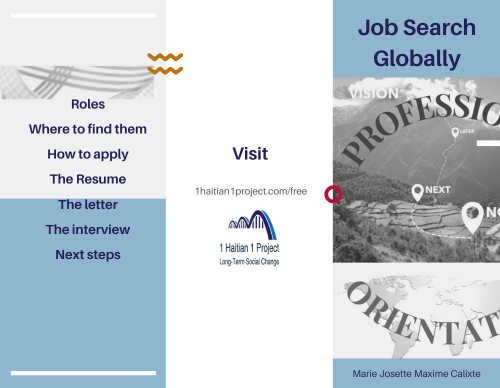
This is a post about roles that are available globally for job seekers, especially those who want to make an impact.
Volunteering
Volunteering can make a world of difference in one's life as much as it would in that of others while designing an ideal career. Volunteering can serve multiple purposes. When volunteering, that the occasion to network around a great cause and to meet like-minded people. The act of volunteering goes beyond doing work.
Some Volunteering Role Examples
Internships
Paid or unpaid, internships connect future professionals with counterparts and companies in a relationship that sometimes become actual work contracts.
Interim Jobs
Doing contractual work through employment agencies can fill gaps in between two long-term positions or for personal reasons. That's usually a temporary solution.
Short-Term or Long-Term Positions
These roles carry the notion of time frames attached to them, as in a few weeks duration, or with a definite period that may be renewable. A long-term position, on the other hand, mean that the work contract is open-ended.
Find out what your ideal career is
Part-time or Full-Time
This has to do with the number of hours per week that are worked. A schedule is usually said to be part time when it is less than thirty-five weekly hours. Students work part time when school is in session.
On-Site or Remotely
Since the COVID-19 pandemic, more companies than ever have hired and retained employees who work from home either consistently or in hybrid mode (a few days on site, a few days remotely).
Per Diem
Workers who get paid for their daily output may be employees or not wherever they work depending on the contract that exist between the payor and the provider of service. A freelancer's basis to receive payment can be termed per diem, while someone with the status of employee may also receive a per diem if payment relates to work during a period defined as one day at a time.
Freelancing
This is not an employment opportunity in the traditional sense because the worker is considered to be self-employed (or independent).
Online
On LinkedIn and Indeed
On this professional network platform, ensure your resume is up-to-date.
Job Boards, including Indeed
Indeed is one of many job boards that publish job postings.
Company Websites
Directly go to the website of any company where you would like to work and look for their career section to see which openings they have, unless you want to inquire directly about anything specific.
Roles Available Worldwide in 2025. Apply Today!
Government Agencies
National, international, or local agencies have recurring needs of personnel. Subscribe to their mailing lists and ask how the hiring process goes. Do not forget the Department of Labor's website dedicated to the unemployed.
Non-Profit Organizations
Churches are often non-profit organizations. Universities and libraries may also be classified as such. Furthermore, founders may elect to register their companies as non-profit organizations because of the purpose of the entity, among other reasons.
International Entities
Store chains, franchises, embassies and consulates, car companies, airlines, travel agencies, banks and many companies of various industries maintain some form of global presence.
The search bar can return filtered and unfiltered results regarding companies with current job listings. Click on the buttons that matter to you on google.com, and then type the role you want in the address bar with the word jobs attached to it.
Off-line
Classifieds Sections of Newspapers
Employers and job seekers post their classifieds in this section. Therefore, both parties can find one another at times.
Restaurants
This is one of the sectors that needs employees from opening to closing and for most of the tasks at hand. Plus, everyone has to eat, and there's no shortage of restaurants that are hiring. You just have to ask for work.
Malls and Stores
The statement made above for restaurants is also valid for trade.
Transportation and Moving Companies
As long as migration keeps expanding from rural areas to cities and from countries to other continents, there will be the need for transportation and moving companies. People move. Merchandise also moves from point A to point B. So do pets.
Healthcare
One of the most crucial industries where the customer (patient) does not always choose which service to go for. There is this need for feelings of renewed compassion, of efficiency expected of humans that makes healthcare companies constantly hire in all competency areas, and not just directly to provide care to the person or the animal.
Types of Roles with High Demand for Workers
Education, customer service, nursing, cleaning, information technology, human services (that benefit children, adults, the challenged), sales, construction, telecommunication, supervisors and managers.
Radio and Television
Well, radios can fully operate online these days unlike the way that used to be, say, thirty years ago. The availability of plenty of programs online and on demand is a great treat for those of us who aren't obsessed with soap operas. It is necessary to occupy every minute of broadcasting and it is surely the responsibility of at least one person.
'Now Hiring' Signs
They often get posted on storefronts or by sidewalks, and even on corporate billboards that do minute order processing for customers who stay in their car from order to payment and delivery.
Word of Mouth
Let people know that you would welcome references or a good word from them spoken directly to prospective employers or written to them. If, in addition, you share the type of position that specifically interests you, this could well lead these good souls to think about making relevant recommendations to you. Who knows?
Click or tap here to start reading this series of articles on job search starting with the first page.
This is a post about how job seekers can apply for roles globally, especially those who want to make an impact.
Online
Using a Job Board Application
Let's say you are using Indeed to apply for a job. Then, you may have to select whether or not you want to link the resume you filled out on that platform, or to attach one that you uploaded. Do not be surprised if some employers require some testing be completed before you can submit your application. Fortunately, you also have the option to show off your skills on your Indeed resume by taking assessments that make sense for roles you are looking to fill.
Applying on the Company Website
You will often have to create a profile before you can apply directly on a company website, but this only takes a few minutes.
Applying via a Third-Party HR Software
Unless the company you are considering is part of a platform of which you are already a member, then you will have to sign up first.
[Placeholder]
Off-line
Using a Paper Form
Certain companies will require an application be filled out for their internal archives whether or not one was previously submitted online through any channel they chose.
In Person
To Gauge Presentation and Manners
Whether or not, you meet with the potential employer early or at the interview stage, there are jobs where self-presentation and manners count so much, that you can be certain the way you come across is going to weigh in the final decision to hire you. For instance, if you want to be a television show host, would not you expect the hiring manager to want to meet you in person before making any decision?
To Gauge Abilities
The typical role that may require the testing of abilities for the job is lifeguard. When someone who claims they can swim applies for a job that give such a person to save others while they are in the water, it would make sense that you pass some thorough exams before you start working.
A Word about Assessments
They Take Several Forms
Whereas some employers do not pre-assess candidates, especially those who are licensed and are experienced the higher their university degrees, many do require job applicants to prove they are capable of performing with a competency test. Besides that one, there also are psychological tests, logical tests which can be lengthy with the same question asked two or several times in various ways, color tests, word test, writing test, math test, typing test, situational test that we can also refer to as simulations, etc. If you did not know, now you are aware and should be well prepared when you want to seriously start applying for roles that are meaningful to you.
Click here to start reading this series of articles on job search starting with the first page.
Every position for which you are applying should have its own relevant resume, especially to bring attention to specific skills that are required.
Your New Role vs Job Openings
Where do you Currently Stand?
First ask yourself where you stand. For instance, are you a student without experience or someone who is counting down the number of years left to retire? Are you switching careers or is a promotion what matters more to you now? Maybe, you want more money. How about you want a certain lifestyle while working. Is what you want in equilibrium with what's possible at this stage of your life?
Do you Want to Be Doing Anything Specific?
This is quite difficult to answer if you have never taken the time to ponder the question. If you have been just routinely working without enjoying what you do, it's time you find out what your calling is and if you are aligning yourself with the activity that feels fulfilling to you.
Is the Company more Important or is their Mission?
You have a choice between going with a company just because they hire you or choosing a mission that resonates with your values, too.
Useful Articles and Tools by Indeed
Write or Adapt your Resume
Do it Yourself
You can write your resume in many ways:
- line by line.
- with a template.
- using tools available on a job board platform.
Have it Done
You can pay someone to professionally write you a resume:
- it's a paid service that you get from someone who offers such.
- someone you know and who can do the job.
- someone you find on a job board platform and who is a specialist of resume preparation.
How to Write or Adapt your Resume
Basic Information
All resumes include the following points:
- Your contact details although you don't have to write down your street address, even if most job seekers do. Your address may only include the name of the city and that of the country. Overall, identify yourself with your name, city, country, email, and telephone number, if you are applying online.
- If you have work experience, you list that first, starting with your most recent job.
- If you don't have work experience, you start with your level of education, diploma, or degree.
- List languages you speak fluently and do mention that. Add those you can read and/or write.
- List software and technological applications you can use proficiently for the role you want.
- List awards you have gotten at work, in your community, from your professional association.
- List awards you have gotten as a student if you do not have work experience yet.
- Do you play any sports? Do you want to mention a hobby?
- How about the fact that you might be a great problem solver or speaker?
- Can you teach? Are you a thorough person? Do you remain calm in all situations?
- Are you able to deliver great customer service? What makes you say that?
- Are you able to interact with professionals at all levels whether they are internal or external?
- Finally, pay attention: List the skills that you do have and that match the job requirements.
Information that Matters
Besides listing the skills that you do have among those that are required for the job, it is important that you include, in your resume, such details as those that could position you in a favorable light. For instance, say you want to work in a certain company department where you know that they would want the person in the role you want to travel extensively, you'd better be ready to travel, have a valid driver's license and passport, and everything that makes sense in your future function. Then, mention it. Same if you have to be licensed to practice. Confirm you have yours handy.
Keywords, keywords, keywords!
Make sure that you put keywords in your resume that the potential employer will be looking for. How do you know which ones to write? It's easy. In fact, the job posting can serve as your question checklist line by line. When you focus well enough, it is possible to notice what matters for the other party even in a long paragraph. Read the job posting several times, if necessary.
Next: The Letter
Take the time to read the post that explains how to go about your application letter. It is sometimes required, other times not. In any case, it may be in your interest to write one just so you can explain why you are a good fit for the role. See you there!
Click here to start reading this series of articles on job search starting with the first page.
You should add a cover letter to the resume for many positions you are applying for, especially if this is necessary or beneficial to you.
What you Need
The Job Posting, your Resume, and a Checklist
The job posting is the source document from which every piece of information comes so you can prepare the resume, the checklist, the letter, prepare for the interview, and eventually, do your job once hired.
Create a Checklist using the Job PostingYou could have done this step when you were preparing your resume but it is also good that you got to check it off your to-do list as soon as you could. You must revise your resume for every job posting anyway, remember? How do you create a checklist from the job posting? Look for everything that seems important for:
- the employer, for instance, skills, language, experience, location, availability, academic grades, licenses, certifications, etc.
- yourself, for instance, salary, job description, requirements that match what you have, requirements that you do not match, requirements for which you can substitute either experience or education, location, schedule, benefits, type of contract, contract duration, etc.
- the human reader versus the machine reader, for instance, keywords that match (for the machine reader), percentage of keywords that you have (for the machine reader), how you express what you're bringing to the job (for the human reader), how you express that you are a good fit for the company and the job (for the human reader), past accomplishments that are relevant for the position (for the human reader), your predisposition to contribute meaningfully to the mission of the organization, if you are sincere and can prove it, for instance, not a clock watcher and willing to work overtime or to help with events (for the human reader), etc.
Adapt the Written Resume to the Job, Specifically
At this stage, the resume has already been written but there will be as many final versions of it as necessary for every single job that interests you. Go down your checklist and adapt your resume.
[Placeholder]
Write the Application Letter
The Job Posting, your Resume, and the Checklist are Ready
You are going to optimize the act of writing your letter thanks to those documents:
- go down the checklist you just created and that matches the job posting.
- check every point that appears both in the posting and in your resume (in a favorable light).
- do not check any point that appears in the posting but that your resume could not show.
Research the Company
What can you uncover about the company that you can use to your advantage as you write your letter? Your company research will also be useful during your interview, later. You want to be knowledgeable about the services and products they offer as well as be well informed regarding the following:
- year founded
- founder's name (or founders' names)
- president or director's name
- location
- type of entity (legal registration, size, local, national, international, family-owned, etc)
- public traded or not (if yes, stock name & abbreviation, the company valuation, etc)
- website
- social media profiles
- company reviews (if they hire and fire a lot, employees' level of satisfaction, if they use an employment agency, if there is adequate training for roles that requires that, if they micromanage, if the company is involved in their community, etc)
- salary range they pay
- types of roles the company hires for
- number of employees
Your Strengths
Let it be know that you fulfill the requirements that match your strengths somewhere at the beginning of the letter, and in a conversational tone. The best way to do so is to illustrate with a concrete example using the SMART acronym that stands for Specific, Measurable, Attainable, Relevant, Time-Based. For instance, if the potential employer points out something that is important to them (Relevant) and which happens to be something you can do easily, from experience. Well, tell the story that puts you at the center when you did (Attainable) exactly (Specific) what is expected and describing clearly the context in which the event or action in your story took place. Do you have numbers, milestones, comparison parameters (Measurable)? Was there a timeline (Time-Based) such as deadlines to meet?
Your Weaknesses
Nobody expects you to spend a lot of time pointing out what seem to be your weaknesses as they relate to the job you want. However, whether mentioned in the posting or not, it is in your best interest to show how you might still qualify with some skill or factor that the employer might want to substitute. For instance, you might want to consider years of education or a degree for a percentage of the amount of experience they really want you to already have. Moreover, if you are coachable, let it be known, because many employers would rather train a new employee than have them perpetuate bad habits or work in a way that does not correlate with company culture.
Tie Up Loose Ends
Conclude with a paragraph that reminds your reader of how much of a valuable asset you can be to the company (if that is truly the case), or how well your strengths match the most important factors that appear in the job posting, or how you see yourself contributing to the role for which you are applying (especially if it is either a startup company or a newly created position).
Submit your Completed Application
As Requested
Sometimes, the posting will include some wording that tests good readers who can separate themselves from those who either do not pay attention to details, or from those who do not follow directions well. For that reason, before you submit your application, read the posting one more time. Look for the following:
- were you supposed to write an email instead of using any job board platform or the company website?
- if you were supposed to write an email, is there any phrase or word that you should put in the subject line?
- does the posting direct you to copy your resume and paste in the body of your email?
- does the posting recommend that you send a copy of the email to someone or a department in the cc line?
- does the posting warn of an application deadline? (If so, every component of the application must be sent in one go).
- does the posting specifically mention licenses, certifications and the importance of having them? (If the posting or the role requires any or a combination of those credentials, make sure you are fully qualified before you apply).
- does the posting require a certain level of education, experience, or expertise for consideration?
- does the posting say that the job is to be performed on site or that you have to be a local resident to apply?
- does the posting say you must be bilingual or trilingual?
- does the posting say that you would be an employee?
- does the posting say that you would be a freelancer? (If so, that means you are not an employee. You are an independent worker or you could fulfill the duties in the name of your business, if you have one).
- does the posting point out that the role would be commission-based, or salary plus commission? (If so, this type of position entails payment based on work output. You earn as much or as little as your results show).
- does the posting specify that hiring for the role is contingently on the approval of budget or grant? (If so, it's okay to apply but if the budget for the role is not approved, the company will freeze the hiring process).
- does the posting include some request for references? (If so, ask people if they are willing to speak on your behalf before you add their name to your list of references).
- does the posting require that you agree to a background check? (If so, that can cover a range of checks that may be of interest to the employer or not, such as your credentials which they would verify by contacting your colleges and universities, your credit check, and experience as well as employment verification).
- Etc. (Remember to read the posting line by line).
Next: Will you Receive an Invitation to Interview?
Who knows! If you did everything that you could to apply to the job you really want by meticulously following every instruction the employer gave, then, you should hope to be among the best candidates and that you drew positive attention to yourself and to your application.
Click here to start reading this series of articles on job search starting with the first page.
You've applied and you are one of the rare people who have been invited to interview for the position. Congratulations!
The Way you Present Yourself
When you are interviewing for a company function, the employer (or their representative) wants to meet you in person (and since recently, virtually, too). Wear little to no perfume on classic ironed clothing and polished shoes, show good hygiene (hair, teeth, nails, skin, natural odor, etc) and watch your language, if that tends to slip.
Interview Preparation
One or two days before the D-day, use your current mode of transportation to actually go to the address of for your interview so you can time yourself in the same conditions (traffic, time of the day, parking space or time it takes to actually be by the entrance door, etc). Google Maps may be all you need, if you are familiar with the area. If the meeting is taking place online, download the meeting application and sign up. Prepare your background (actual or virtual). Have you prepared questions and answers applicable to: The job post, yourself, the company. Is your search log so well filled out that you can access the information you need and review at your pace before you attend the meeting? If you are going to perform remote work, do you have high-speed Internet, a computer or a laptop (your own, unless that will be provided), a landline telephone (if required)? If your future role is going to put you on the road, is your driver's license current (or renew it as soon as possible) and are you going to use your own car (unless a company car is one of the privileges that come with the position)?
Documents to Bring with You
Even if you've already submitted a package (resume, letter, and probably the application itself), most interviewers have the habit of asking if applicants brought a resume with them to the interview. Well, you should bring at least your resume with you, and your letter, if possible - for one, two, or three people depending on how many people you expect to be interviewing you. Some candidates print the units that compose their package on cotton paper. Others, just do so on regular paper.
It's Interview Time!
The Interview
Be yourself, truthful and attentive. Show genuine interest in the position, in the company, and in your interviewer's conversation with you. If you sense you are being tested and under observation (for instance, for a sales position), do sell, because it would not be an impression as your interviewer might really be in testing mode with you from the moment you meet and shake hands.
The Way you Answer Questions
That should be as concise and clear as necessary, or as detailed and clear as necessary. All questions are not created equal. Give examples every time that you should. Pay attention to the tenses (past, present, conditional, future) that are embedded in the questions. Finally, when it is about yourself, do not put yourself down in any way or sound incredible in any of your statement. Remember that the potential employer has limited time to see as many people as possible. That's their job during the interview phase. Yours is to be the best human representation of your application, resume and letter and to stand out in a good way to the point where if there is anything you should add during the interview that is not appearing in your documents, it is your time to shine. For instance, what's the latest news about the company that they would be proud to see you know about? How can you bring that into the conversation to show your genuine interest in the company, and not just in interviewing for a job?
Questions about Yourself
The recruiter is trying to understand from what you say, what your resume shows, and the requirements for the job as well as the big picture of company culture, where you fit. For all of those reasons, you should know the answers to the following questions: your good qualities, your bad qualities, your strengths as they pertain to the job, your weaknesses as they pertain to the job, how you solve problems, how you have solved problems on the job, achievements on the job (with a number, a timeline, a percentage, a rate of improvement, etc), the handling of difficult customers, how you cope with stress and deadlines, how do you make it work with difficult bosses or supervisors, event organization, communication skills, salary requirements, etc.
Questions you Should Ask
There are so many questions you should ask, but some of those that many employers want to hear show them you came prepared and that you gave some thought to everything that you should learn during the interview whether those details get brought up or that you should ask for clarification.
The Interview goes Both Ways, in Fact
You do not have to adopt a passive attitude when interviewing for a position. In fact, you do not even have to accept the first position you get offered, if you feel that your expectations match your ideal role, if the first position offered is not your ideal role (if you discover this during the interview). You meet with your interviewer with the intention of finding out if you'd be happy in that environment (if you are not interviewing away from the workplace, remotely, in some public place, or at an employment agency). You also want to see if employees look happy, stressed, fine, or else. Add anything that matters to you and that would not be out of place in an interview or during your visit, or if it feels awkward to either ask or discuss about certain things.
Towards the end of the interview, it is a good idea to ask for a business card from each interlocutor, to check that you can pronounce their name, before leaving. You can use everyone's email address to send a thank-you note. This ensures your mail gets to the right person. Click on the 'next steps' button below for the next step.
Click here to start reading this series of articles on job search starting with the first page.
You went to the job interview! What to do at this point?
Do they Promise to Follow Up?
Great! Start counting hours and days down until the day you hear back from your interviewer.
Should you Follow Up?
It depends. Some recruiters might invite you to do so. Some job platforms might also encourage to write a note and inquire about the status of your application.
Did you Get Hired on the Spot?
Awesome! You should be invited to fill out some paperwork and to submit your official documents, by appointment or immediately. What happens next may vary depending on the company and the position.
An article that points to eight signs indicating you might be a top candidate
What to Do When you Reach Home?
Breathe
Were you thinking it was going to be that you had to jump on your email to write a thank-you note? Sure, why not! You can do that or handwrite it! Do show gratitude, but first, breathe, and enjoy the moment because you just reached a milestone in your job search process that can help you see things more clearly and compose a more meaningful thank-you note after reflection. It's time for some introspection:
- was that your first interview during your job search?
- was that your second or third, etc?
- If that was the first, think back about what you think happened that seemed positive.
- If that was not the first interview, ask yourself if you have been asked to interview by either the same type of company, for similar roles, or if you have spotted any trend during either your job search or the application process or the interview process.
- If you can tell of any trend, pause and think if that is any indication as to something to reinforce, a route to pay closer attention to, or anything you have to correct.
- If you can tell what was positive during your interview, make that even better next time.
There is always something to learn as well as room for improvement. Keep adjusting and improving everything that either works or that you do well.
Set up Alerts for More of the Jobs you Want
You can do that on job platforms, on company websites and on Google.
Create More Scanned Versions of your Resume
Match those new versions to the new jobs that get suggested to you as you keep applying. Do use a resume scanner. That's called an ATS, or Applicant Tracking System.
Attend Job Fairs
This happens periodically either in colleges and Universities, or within certain companies, or online.
Apply for More Jobs until you Get Hired
You are applying so you can get hired, interviewing being just one step in the whole process. Keep your eyes on the prize!
Temporary Contracts
Just so you keep the influx of cash active, it's a good idea to accept per diem work or task fulfillment missions. How about contracting via a staffing agency, in the meantime?
Volunteer
Not only you can apply through international organizations, but your hospital, church, and many local institutions might have programs in place to train you, give you practicum for a role that you are contemplating, or plain accept the help you want to give.
Keep Training
The world keeps evolving and it is our duty to remain marketable. Update your skills and learn new ones continuously to keep up and to position yourself well.
Get Certified or Licensed, or Both
One of the licenses that makes life easier is the driver's permit. And then, there is that of your profession if you must obtain one. In some cases, you have to renew yours as long as you remain in practice. Certifications, on the other hand, are attestations of either verified performance or verified experience.
While a license is often national (therefore official in a given country and often for regulated professions, such as law, medicine, nursing sciences, insurance, etc.), an organization (often private) whose mission is to ensure that the exercise of certain functions or professions rigorously follows established standard principles of excellence, certifies professionals who adhere.
Any Projects you'd Want to Materialize?
If you've ever wanted to do something special for yourself, your family, or your community, the gap between two jobs, is the perfect moment to get something impactful done.
Have you Ever Considered Entrepreneurship?
If yes, start by exploring opportunities such as those with low cost, or no barrier-to-entry, or franchises, acquiring existing businesses, or freelancing, or an online business, or affiliate marketing, or working as an independent professional. Keep working as an employee to transition smoothly into entrepreneurship. Be sure to get advised legally and by your accountant because there can be a wide gap between what you think something is and what the reality is, depending on your level of risk tolerance.
Meet People
Yeah! Grow your helpful circle!
Click here to start reading this series of articles on job search starting with the first page.

